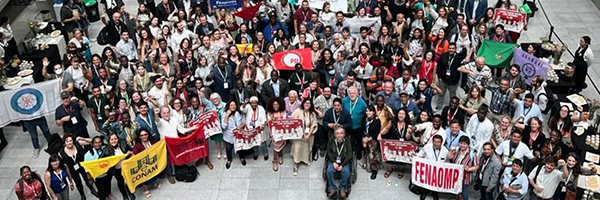Santiago Declaration Envisions End Of Neoliberalism Death Spiral
A New Manifesto Calls For Building “A Sustainable Social Pact For The 21st Century” In Which “Our Rights Are Guaranteed, Not Based On Our Ability To Pay, Or On Whether A System Produces Profit, But On Whether It Enables All Of Us To Live Well Together In Peace And Equality.”
An international coalition made up of more than 200 trade unions and progressive advocacy groups on Thursday published the Santiago Declaration, a manifesto for “a complete overhaul of our global economic system.”
The undeniably anti-neoliberal document proclaiming that “our future is public” is the product of a meeting held in Chile—the “laboratory of neoliberalism” where Milton Friedman and his University of Chicago acolytes’ upwardly redistributive economic model was first imposed at gunpoint by Gen. Augusto Pinochet’s military junta.
From November 29 to December 2, more than 1,000 organizers from over 100 countries gathered in Santiago and virtually to germinate a left-wing movement against “the dominant paradigm of growth, privatization, and commodification.”
“We are at a critical juncture,” the manifesto begins. “At a time when the world faces a series of crises, from the environmental emergency to hunger and deepening inequalities, increasing armed conflicts, pandemics, rising extremism, and escalating inflation, a collective response is growing.”
“Hundreds of organizations across socioeconomic justice and public services sectors—from education and health services, to care, energy, food, housing, water, transportation, and social protection—are coming together to address the harmful effects of commercializing public services, to reclaim democratic public control, and to reimagine a truly equal and human rights-oriented economy that works for people and the planet,” reads the document. “We demand universal access to quality, gender-transformative, and equitable public services as the foundation of a fair and just society.”
The Santiago Declaration continues:
The commercialization and privatization of public services and the commodification of all aspects of life have driven growing inequalities and entrenched power disparities, giving prominence to profit and corruption over people’s rights and ecological and social well-being. It adversely affects workers, service users, and communities, with the costs and damages falling disproportionately on those who have historically been exploited.
Against the heavily privatized status quo, “we commit to continue building an intersectional movement for a future that is public,” the document says. “One where our rights are guaranteed, not based on our ability to pay, or on whether a system produces profit, but on whether it enables all of us to live well together in peace and equality: our buen vivir.”
According to Global Justice Now, the Transnational Institute, and other signatories, the creation of an egalitarian and sustainable society hinges on ensuring universal access to life-sustaining public goods delivered by highly valued workers.
“Who owns our resources and our services is fundamental,” the manifesto argues. “A public future means ensuring that everything essential to dignified lives is out of private control, and under decolonial forms of collective, transparent, and democratic control.”
“Who owns our resources and our services is fundamental,” the manifesto argues. “A public future means ensuring that everything essential to dignified lives is out of private control, and under decolonial forms of collective, transparent, and democratic control.”
As the Santiago Declaration explains:
A future that is public also means creating the conditions for enabling alternative production systems, including the prioritization of agroecology as an essential component of food sovereignty. To that end, we need to take back control of decision-making processes and institutions from the current forms of corporate capture to be able to decide for what, for whom, and how we provide, manage, and collectively own resources and public services.
The call to build “a sustainable social pact for the 21st century,” the coalition observes, “follows years of growing mobilization around the world.”
It also comes as a complementary alliance convened by Progressive International meets in Havana, Cuba to map out an emancipatory “new international economic order.”
During Friday’s opening session, former Greek Finance Minister Yanis Varoufakis called for the establishment of a movement capable of dismantling “the existing, exploitative, catastrophically extractive imperialist international economic order so as to build a new one in its place… in which people and planet can breathe, live, and prosper together.”

 Kenny Stancil,
Kenny Stancil,